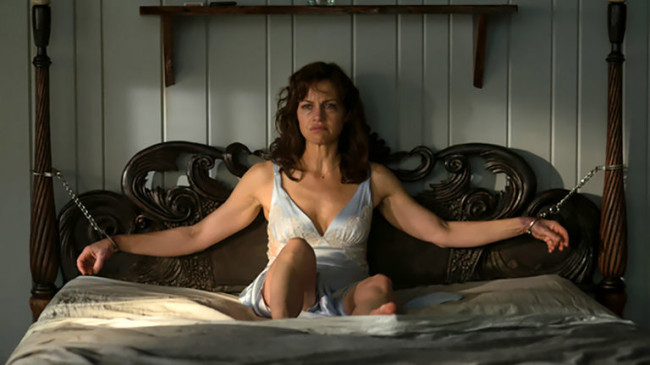

We promise we're not a Stephen King fan site. It just feels like it these days with three major King adaptations (all meshing nicely with this site's interests) being released over the last two months. The Dark Tower fizzled while It floated to spooky-good heights. Gerald's Game, released this weekend on Netflix, falls somewhere between the two but closer to It on the spectrum. It's a solid, well-meaning take on an underrated King book that many thought was unadaptable. Director/co-writer Mike Flanagan (Hush, Oculus) felt otherwise and turns in an incredibly faithful rendition of one of King's most outré tales. I've got one specific nitpick, which we'll get to in a spoiler-heavy section at the bottom of this review. But first, the basics …
The eternally underrated Carla Gugino stars as Jessie Burlingame, a 40-something trophy wife whose marriage to Gerald (Bruce Greenwood), a successful older man, has stagnated. The film opens with the couple traveling to an isolated family lake house for the weekend in an effort to rekindle their marriage with some good, old-fashioned sex play. For Jess, that means busting out a fancy new slip. For Gerald, that means hand-cuffing Jess to the bed and acting out his rape fantasies on her. Jess is not amused, an argument breaks out and Bruce has a heart attack, collapsing directly on top of her. She kicks him to the floor, where a pool of blood slowly amasses around his head. Still handcuffed to the bed, Jessie can't reach the keys. She can't reach her phone. No one can hear her scream. and no one else is expected at the house for weeks.
From that simple setup, it's a story of survival with Jess racing against the clock to escape her predicament before she dies from dehydration. And it's not just the handcuffs that are a problem. There's also the stray dog that's wandered in to feast on Gerald's corpse and is starting to eyeball Jesse while licking his chops. In King's book, almost all the action is internal, with Jesse talking through her situation with a variety of phantom friends and family members while trying not to lose her mind. For the most part, the movie version of Gerald's Game limits Jessie's imaginary companions to just two — Greenwood's reanimated corpse and a tougher, headstrong version of Jessie that she rarely let out in real life. The two delusions circle around her in the room, a sort of angel and devil on her shoulder, giving large portions of the movie the feel of simple three-person play with Gugino playing two of the characters. Before long, though, Jessie's mind wanders even further, to the memory of her father sexually abusing her during a solar eclipse when she was a child. And to the Moonlight Man, a hulking demonic entity she thinks she sees skulking in a dark corner of the room at night.
It's an understatement to say the movie falls on Gugino, and she's pretty great in the role, with the occasional assist by Greenwood. I do wish Flanagan had been a bit more adventurous with the camera. A film set almost entirely in a single room seems like a good time to be bold with angles and movement — trying to mimic Jessie's increasingly fractured state of mind — but the film has a flat look filled with standard mediums and close-ups, throwing in the occasional overhead shot looking down on the bed. Flanagan's use of color is a bit flashier, especially the harsh red that fills the screen during the flashback eclipse scenes. But, for the most part, he lets the actors do all the heavy lifting, and the result is a dramatically engaging hour and 43 minutes that appropriately builds in intensity.
Okay, onto major spoilers now. Please turn back if you haven't read the book or watched the movie and don't want to know …
Gerald's Game features one of the biggest twists in King's bibliography, a hotly-debated surprise that some folks write off as improbable but that I always considered to be the best and maybe most notable thing about the novel. Throughout most of the book, the Moonlight Man (or the Space Cowboy, as he's called in the text) appears to be yet another figure of Jessie's imagination — an unpleasant hallucination created by her increasingly fragile state of mind. However, at the end of the book and movie, we learn that the Moonlight Man is very real, a unwelcome and horrifying intruder who watched Jessie as she struggled, haunting her not from her subconscious, but from the very room she was trapped in. To those who didn't see it coming, it's a terrifying punch to the gut, and my biggest curiosity when it came to the film adaptation was how Flanagan would handle the character and the reveal.
The design of the Moonlight Man, played by Twin Peaks' Carel Struycken, looks fantastic (the hair will stand up on the back of your neck), but Flanagan makes a couple of creative decisions in how he's presented that I don't agree with at all. For starters, immediately before we see the ghoulish giant for the first time, Flanagan inserts a sort of first-person shot mimicking someone walking through the hallway outside of the bedroom. (The dog even glances up nervously at the camera that's standing in for the intruder.) I hate this shot. Having read the book and known what was coming, I can't be certain about how a newcomer to the story would react to it, but to me it feels like too big of a tip-off that the Moonlight Man is real and not just a figment of Jessie's imagination. Had it been up to me, I'd have edited out that short shot outside the room and made no hints of the Moonlight Man until he materializes in the corner of the bedroom.
I also just wish there was more of him. It's been a long time since I read the book, but in my memory, the Moonlight Man terrorizes Jessie over several nights. She's convinced he's not real, but the vision of him returns repeatedly to challenge that belief. In the movie, it doesn't feel like enough time is devoted to him to justify both the damage he inflects to Jessie's psyche and the reveal that he's a totally real psychopath after all. Ultimately, the character and the twist still work, but not as powerfully as they could have had the entire subplot been given a bit more weight. Maybe people discovering the story for the first time via the movie will feel differently. If so, I hope they'll comment below on whether they saw the twist coming and if they bought it or not.
Jessie's struggle to escape both the handcuffs and her past is enough to make this a film worth recommending. And there's no doubt that's what Flanagan was most focused on. But whether or not the Moonlight Man reveal works for you will likely determine just how highly you rate Gerald's Game among the ever-expanding list of King adaptations.











